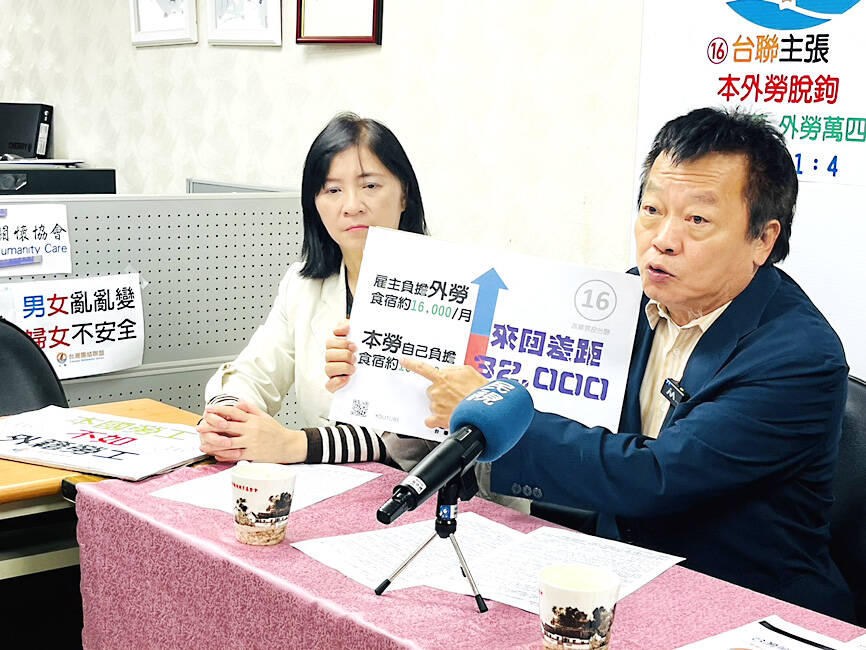Taiwanese should be paid more than foreign workers due to rising housing and living expenses, and it is time the government fixed its misguided minimum wage policy, the Taiwan Solidarity Union (TSU) and the owner of a human resources firm said yesterday.
The government’s policy “is the main cause of wage stagnation, as [it] actually works to exploit Taiwanese workers, while appeasing foreign workers with good pay and benefits,” TSU Chairman Liu Yi-te (劉一德) told a news conference at the union’s offices in Taipei.
“Wage parity is a foolish policy, and it is time to abolish it,” Liu said.

Photo: Chen Yu-fu, Taipei Times
On Monday next week, Taiwan’s monthly basic wage is to rise to NT$27,470 (US$ 882.15), an increase of 4.05 percent, he said.
“It is the eighth straight year that the government is increasing the minimum wage to the same figure for Taiwanese and migrant workers. Superficially, it looks like a benevolent measure to ensure fairness and equality among all workers, but in reality, it is a naive and misguided policy,” Liu said.
The two groups have different living conditions, he said.
“Taiwanese workers ... have additional living expenses, which at the bare minimum are NT$16,000 per month, so ... they are left with only one-third of the income of foreign workers,” Liu said.
Companies must provide accommodation and meals for foreign workers, which are deducted from their pay, but do not cost much, unlike the high housing and living expenses Taiwanese face, Liu said, adding that many foreigners also work overtime to earn more.
“Taiwanese workers are being abused by our government. This foolish policy has been in place for more than two decades. The Chinese Nationalist Party (KMT) and Democratic Progressive Party administrations chose to ignore the issue and sided with corporate interests while exploiting their own citizens,” he said.
For Taiwan to be competitive, Taiwanese must receive a minimum wage of about NT$40,000, while foreign workers should earn a basic wage of NT$14,000, Liu said.
Inflation eating into wages is seldom talked about, National Federation of Employment Service Association honorary chairman Huang Kao-chieh (黃杲傑) said.
Taiwan began importing foreign workers in 1991, and their monthly pay was NT$11,040, while Taiwanese college graduates were earning a minimum wage of just more than NT$20,000, he said.
“Now the minimum wage is rising to NT$27,470 next week, while Taiwanese college graduates working entry-level are earning just more than NT$30,000. So after 30 years, we have foreign workers earning three times what they were receiving in the 1990s, while Taiwanese workers only have 30 percent more pay,” Huang said.
Inflation has reduced the value of wages to levels seen in the 1990s, he added.
“Opening up to foreign workers has resulted in them becoming a vital source of labor, but it is also the main cause of Taiwan’s wage stagnation,” he said.
“Taiwan now has more than 700,000 foreign workers... It seems like a good policy to take care of foreigners, but someone has to speak up for the rights of the more than 10 million Taiwanese workers, who are not receiving benefits such as ... housing and meals,” he said.

An essay competition jointly organized by a local writing society and a publisher affiliated with the Chinese Communist Party (CCP) might have contravened the Act Governing Relations Between the People of the Taiwan Area and the Mainland Area (臺灣地區與大陸地區人民關係條例), the Mainland Affairs Council (MAC) said on Thursday. “In this case, the partner organization is clearly an agency under the CCP’s Fujian Provincial Committee,” MAC Deputy Minister and spokesperson Liang Wen-chieh (梁文傑) said at a news briefing in Taipei. “It also involves bringing Taiwanese students to China with all-expenses-paid arrangements to attend award ceremonies and camps,” Liang said. Those two “characteristics” are typically sufficient

A magnitude 5.9 earthquake that struck about 33km off the coast of Hualien City was the "main shock" in a series of quakes in the area, with aftershocks expected over the next three days, the Central Weather Administration (CWA) said yesterday. Prior to the magnitude 5.9 quake shaking most of Taiwan at 6:53pm yesterday, six other earthquakes stronger than a magnitude of 4, starting with a magnitude 5.5 quake at 6:09pm, occurred in the area. CWA Seismological Center Director Wu Chien-fu (吳健富) confirmed that the quakes were all part of the same series and that the magnitude 5.5 temblor was

The brilliant blue waters, thick foliage and bucolic atmosphere on this seemingly idyllic archipelago deep in the Pacific Ocean belie the key role it now plays in a titanic geopolitical struggle. Palau is again on the front line as China, and the US and its allies prepare their forces in an intensifying contest for control over the Asia-Pacific region. The democratic nation of just 17,000 people hosts US-controlled airstrips and soon-to-be-completed radar installations that the US military describes as “critical” to monitoring vast swathes of water and airspace. It is also a key piece of the second island chain, a string of

The Central Weather Administration has issued a heat alert for southeastern Taiwan, warning of temperatures as high as 36°C today, while alerting some coastal areas of strong winds later in the day. Kaohsiung’s Neimen District (內門) and Pingtung County’s Neipu Township (內埔) are under an orange heat alert, which warns of temperatures as high as 36°C for three consecutive days, the CWA said, citing southwest winds. The heat would also extend to Tainan’s Nansi (楠西) and Yujing (玉井) districts, as well as Pingtung’s Gaoshu (高樹), Yanpu (鹽埔) and Majia (瑪家) townships, it said, forecasting highs of up to 36°C in those areas